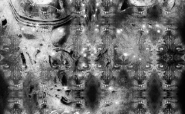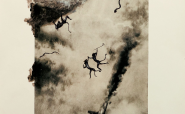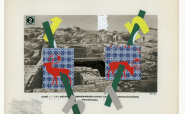| DIVUS LONDON: Asya Flitman and Lyusya Voronova AZBUKA OF MOSCOW FLAT | |||||||||||||
|
|||||||||||||
Asya Flitman and Lyusya Voronova AZBUKA OF MOSCOW FLAT03.06.2008 18:00Divus | en |
|||||||||||||
|
…Once when I came to Moscow, and winter was cold, and evening particularly dark and nasty, I had read in blog by Asya Flitman (http://npocmo-mak.livejournal.com) that she proposed to everyone who liked her paintings to come and pick up whatever. I was surprised and shocked a bit, called her, came, and tried to convince her to save at least best works. Asya answered that she simply didn’t have enough of space in her tiny flat to live in and to paint and keep new pictures. I couldn’t see this wrecking charity and said, - wait, let’s do an exhibition before! I so wanted other people to see that flat I did, - small, warm, filled with pictures from ceiling to floor. So, part of works was saved for wider audience. Lyusya Voronova (http://voronova-art.ru) was the first person i stayed by when I firstly came to Moscow Biennale in 2005. She was the old friend of Martin Zet, and without any questions accommodated me on a cozy floor among paintings and dry flowers. She was then self-sacrificing poverty-stricken artist, cleaned three stupid offices, awoke at 4, was terribly fagged out, stubborn, full of light and extremely unhappy. In her flat I felt like in a song by Boris Grebenschikov, in a godforsaken Moscow church, and in a kitchen of Soviet intelligentsia. The degree of talent correlated with a degree of misery. But she never stopped, and I am happy to see now how changed colours of her works from black and brown to bright and joyful, when she at last got possibility to work, just to work without total disaster. When so suddenly I started to think about an exhibition, Asya and Lyusya, their pictures and their flats immediately got combined in my mind. I wanted to show them together, and to represent in a gallery space the form of flat exhibition that was so important, and sometimes only possible in 70-80-s, first of all in Moscow, and in Soviet Union in general. After falling of empire, so called democracy came, and such shows happened less and less, and then finally stopped. It seemed to everybody then, if democracy came, everything was possible, and any art could be represented in any public space. Intoxication by freedom was changed into crashing of illusions, division, general commercialization and coming of capitalism with Moscow face, main features of which are special snobbism and expensive realization of empty kitsch. Azbuka of Moscow flat could be taken as a historical show. That Moscow doesn’t exist anymore, - child grew up, overcame sincerity and openness. Just some eye-witnesses and joyful, not so contemporary pictures are still there. Alena Boika, Soligorsk – Moscow - Prague, 2008
03.06.2008 18:00
Artículos recomendados
|
|||||||||||||
![Asya Flitman and Lyusya Voronova [b]AZBUKA OF MOSCOW FLAT[/b]](http://88.208.121.86/upload/articles/53b7649ce179e.detailThumb.png)






























Comentarios
Actualmente no hay comentariosAgregar nuevo comentario